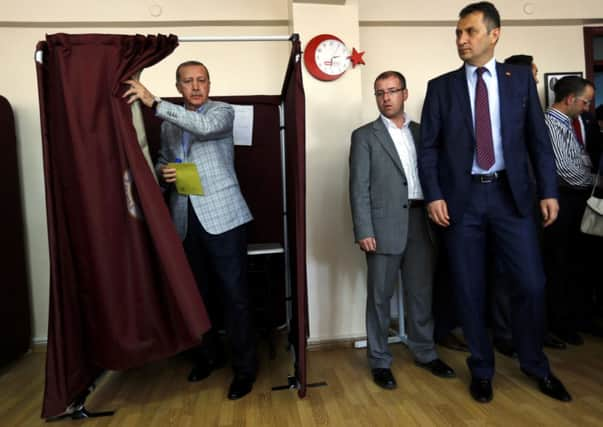Veteran Erdogan wins landmark Turkish election


Mr Erdogan, who has dominated Turkish politics for more than a decade, secured a majority 52 per cent of the vote and had been the strong favourite to replace incumbent Abdullah Gul for a five-year term.
Justice minister Bekir Bozdag announced on his Twitter account: “The chairman of the AK Party and the prime minister of Turkey, Recep Tayyip Erdogan, has become the first president elected by the people.”
Advertisement
Hide AdAdvertisement
Hide Ad“The people are making an important decision … for Turkish democracy, for the future of our country,” Mr Erdogan said after casting his ballot on the Asian side of Istanbul.
Now in his third term as prime minister at the head of the Islamic-rooted Justice and Development Party, or AKP, Mr Erdogan has been a polarising figure. He is fervently supported by many as a man of the people who has led Turkey through a period of economic prosperity. Yet critics view him as an increasingly autocratic leader bent on concentrating power and imposing his religious and conservative views on a country founded on strong secular traditions.
About 53 million people were eligible to vote in the election with an absolute majority needed to win. Mr Erdogan – whose party won local elections in March with about 43 per cent of the vote was widely expected to be elected. Party rules barred Mr Erdogan from serving another term as prime minister. Turkish presidents used to be elected by parliament but Mr Erdogan’s government pushed through a constitutional amendment in 2007, changing the procedure to a popular vote.
Previously a largely ceremonial role, he has vowed to transform the presidency into a powerful position – something his detractors have said proves he is bent on a power grab. He has said he will activate the post’s rarely used dormant powers, including the ability to call parliament and summon and preside over cabinet meetings.
Mr Erdogan’s main challenger was Ekmeleddin Ihsanoglu, 70, an academic and former head of the Organisation of Islamic Co-operation, had the backing of several opposition parties, including the two main ones: a pro-secular party and a nationalist one.
Mr Ihsanoglu, who focused on a message of unity, said voting irregularities had been reported today, with some voters photographing their stamped ballots with their mobile phones. The implication is they would use the photos to receive favours from the parties they voted for.
An official complaint would be filed, Mr Ihsanoglu said.
“The eyes of the whole world are upon us,” he said after casting his vote in Istanbul.
“Turkey has been striving to become a first-class democracy … and hopefully Turkey will achieve this.”
Advertisement
Hide AdAdvertisement
Hide AdThe third presidential candidate was Kurdish politician Selahattin Demirtas, 41.
Asa Lindestam, head of a group of election observers from the Organisation for Security and Co-operation in Europe, said voting at the few polling stations she had monitored had proceeded “smoothly”.
The past year-and-a-half has been a turbulent one for Mr Erdogan, who faced widespread anti-government protests in 2013 triggered by a violent police crackdown on demonstrators objecting to a construction plan in central Istanbul.
More anti-government protests erupted in May after 301 miners died in a coal mine fire blamed on shoddy safety practices.
Mr Erdogan and his son have also been implicated in a corruption scandal.